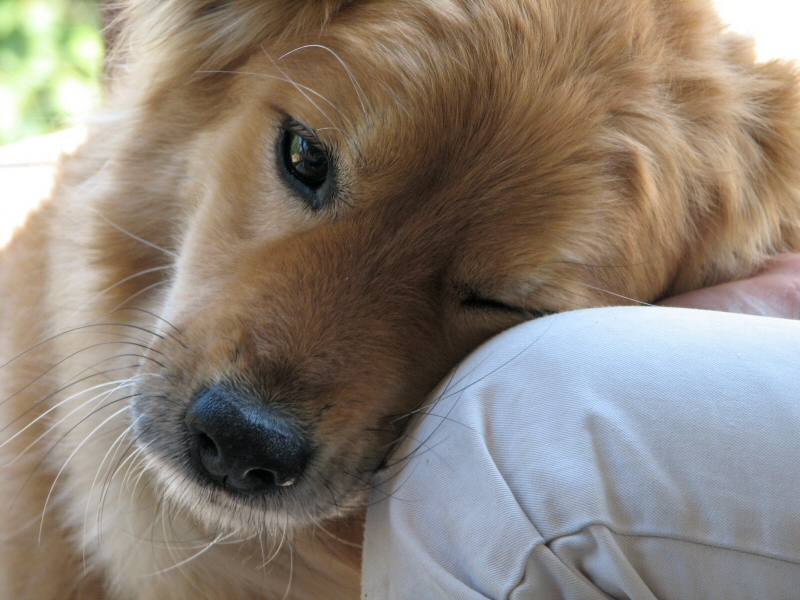A new study, published in BMC Psychiatry, explores the role of pets for individuals diagnosed with a long -term ‘mental illness.’ The qualitative study, conducted in England, finds that pets play a central role in their owners’ daily management of mental health concerns. The authors, led by Helen Brooks, a faculty member at the University of Manchester, recommend that pets be considered when providing mental health services.
The authors report,
“The implications of this study propose that pets should be considered a main, rather than a marginal source of support, in the management of long-term mental health problems.”

Individuals diagnosed with mental health problems often struggle to maintain connections with social networks and experience stigma related to their diagnoses. Research has demonstrated the benefits of Animal Assisted Therapy for individuals with long-term physical health conditions. The value of pet ownership for reducing stress and improving the quality of life has also been shown. Yet, “the role of pets is likely to have been under-acknowledged, with indications in research that some people consider their pets as being as important as family members, and their value in terms of companionship, love, and support is widely acknowledged,” state the researchers.
In an attempt to better understand “the contribution of pets in the broader context of support networks and the role they may play in recovery-orientated activities and the management of mental health,” the researchers conducted qualitative interviews with pet owners who have been diagnosed with a long-term ‘mental illness.’ Fifty-four participants engaged in ‘ego’ network mapping. Network diagrams were created for each participant with three concentric circles. The innermost circle represents people, pets, activities, places, and objects that are most important in managing participants’ mental health, and outer circles represent supports that are important, but less so than more inner circles.
Twenty-five participants reported that they have a pet. Pets were described as most central in 60% of participants (n = 15). An additional 20% (n = 5) placed pets in the second most central circle. Relationships with pets tended to be less important for participants who had strong family and friend relationships, compared to participants who had challenges in these relationships. The authors note, “For these people, the relationships with companion animals took on discrete and definite functions within networks, which were different to the norms associated with human-to-human relationships.”
Participants identified many qualities in their relationships with pets that they felt are more difficult to receive in human relationships, including a sense of trust, validation, and unconditional love. The researchers describe, “Pets were relevant to an individual’s construction of self and played a unique role in the reduction and management of stigma. For example, pets were seen to accept people for who they were without judgment or resentment.” One participant stated, “They [pets] don’t look at the scars on your arms, or they don’t question things, and they don’t question where you’ve been.”
Participants also reported that their pets helped them continue to engage in daily tasks regardless of how they were feeling. One participant described, “You know, so in terms of mental health, when you just want to sink into a pit and just sort of retreat from the entire world, they force me, the cats force me to sort of still be involved with the world.”
Pets demonstrated therapeutic benefits of helping to calm their owners, as well as providing a source of distraction. “Pets provided ontological security through generating a sense of order and continuity to individual experiences and through this close connection provided a sense of meaning to people’s lives” that they may not receive in their social network or broader community, explain the authors.
Many individuals with mental health concerns have pets, and these relationships are often beneficial and should be considered in care planning. The researchers state that the study “illuminated the role of pets as a hidden resource for mental health management and supports the idea of a ‘lifestyle’ approach to the management of mental health problems and prevention.”
The authors suggest that discussing pets in care planning can foster the relationship between healthcare providers and consumers. They also note the importance of addressing pet owners’ concerns about who will care for pets during crises or extended absences (e.g., hospitalizations). The researchers conclude, “These insights provide the mental health community with possible areas to target intervention and potential ways in which to better involve service users in service provision through the discussion of valued experiences.”
****
Brooks, H., Rushton, K., Walker, S., Lovell, K., & Rogers, A. (2016). Ontological security and connectivity provided by pets: A study in the self-management of the everyday lives of people diagnosed with a long-term mental health condition. BMC Psychiatry, 16, 409. doi:10.1186/s12888-016-1111-3 (Abstract)















This kind of an idea might make sense if there really was such a thing as mental health problems.
But as it is, talking about pets playing a role, is simply another way of advancing a Recovery agenda.
So people are being discouraged from redressing the injustices which have destroyed their social and civil standing, and they are instead being told about all the wonderful ways they Recover from and be Healed of their own mental health problems.
This is of course another version of what has long been identified as “second rape”, turning the blame back onto the victim.
Nomadic
Move From Talk To Action, Please Join
http://freedomtoexpress.freeforums.org/fighting-to-eradicate-the-mental-health-system-and-incarcerate-the-practitioners-f2.html
Report comment
2 of my buddies have service dog vests for their dogs, pretty easy get if you have any kind of diagnosis like anxiety or whatever. Beaches and parks even the mall are all good to go then.
Report comment
Until a pet can be patented and hundreds of dollars charged for a “pet therapy” prescription, they will be viewed as a marginal contributor in the field, regardless of the actual data. The term “Animal Assisted Therapy” kind of turned my stomach a bit. Why don’t we just call it “Getting a pet whom you know loves you and gives you lots of affection?” Nothing fancy, really. People need to be loved.
Report comment
Wish I could *afford* a pet, or find housing that allows pets.
Don’t worry, pets ARE just another commodity.
Back in another life, I had a dog who came down with Lyme disease…just a plain blood count from the vet cost 4x what it did for humans back then! The amount of money spent on pets these days is astronomical. And then I start thinking about all the dog poop I see walking around in my town…
Report comment
Dogs may be the best kind of pets for many people, but they are expensive and they need a lot of care, and you’re right, at least in North America, llandlords often don’t want pets in their buildings. This is not good for the collective mental health of a society. Where I live in Europe, lots of people live in apartments and have dogs. Dogs are welcomed into restaurants and stores. They are amazingly well-behaved. I just discovered that the humane society in the city where I live doesn’t euthanize its hard to place animals. What it does is invite the public to come in at set hours during the week to walk the dogs. I think this is terrific idea. I tried it once, but the supply of people eager to walk a dog outstripped the number of dogs on hand.
Report comment
Wouldn’t trade my cat, Sweeny Todd, for anything. He even checks on me when he thinks I’m having physical problems. I have four really great friends but Sweeny is the most devoted of all. I am lucky to have him and to have a landlord who lets me have him where I live. I live on the second floor with windows that face the bus stop where I get off the bus. He’s always watching for me in the living room window and meets me at the door when I come in.
Report comment
I guess I can let down my guard about revealing personal details here long enough to honor the memory of my precious cat Allie, whom I had no option but to let go quite unexpectedly on Christmas Eve, less than a week ago. She died in my arms. It’s fucking me up big time.
Allie has been my ever-present companion for the past 14 years, and during much of my time posting on MIA since 2014 she has been curled up next my laptop. Her absence is absolutely unbearable right now. The energy of her love and personality has silently informed my own hope and motivation for so long. But as much as it hurts at the moment I would never have forgone the priceless experience of her presence just to avoid the inevitable pain of separation.
That said, Allie was not really “mine,” nor was she a “pet.” Animals are fully conscious beings — peers if you will — deserving of the same respect as any human, and more than many. To have them treated as “adjuncts to therapy” is as dehumanizing (de-animalizing) to them as it is to us. And that’s about all I have to say about this.
Report comment
oldhead
Words don’t mean much at times like this, but I am so sorry for your loss. I agree with you. I don’t own Sweeny Todd, who I refer to as my cat; we are friends traveling the same road in this part of our Journey. The two of us became friends the day I left the homeless shelter for my first apartment after discharge from the “hospital” where I now work. He was a homeless cat who showed up that afternoon at the shelter and when I got my clothes into my friends car Sweeny climbed in, laid down, and looked at us as if to say, “Let’s get this show on the road!”
It sounds like Allie and you were very lucky to have one another for all those years.
Report comment
Thank you Stephen. It takes another “cat person” to understand the enormity of this.
Allie was the last remaining member of a four cat family which, from the first arrival till her passing, spanned almost a quarter century. Most of them, like Sweeny Todd, chose me rather than vice versa. It didn’t take more than the first loss to significantly reorder my priorities as to what’s important in life, or to appreciate the precious uniqueness of each one of my companions. But events like this sure drive it home with a mallet. Thanks for noticing.
Report comment
Sorry for your loss Oldhead.
This is another no brained research article.
And yes for those who mentioned it – it does very much go into the privilege problem.
At least some things are changing in this regard in terms of rental places.
Shared pet sharing is a newer option as well.
Report comment
Well everything that relaxes out brain is good is beneficial to us. I find fish very relaxing and a perfect pet for a person with mental diseases. Their grace calms down your mind in every situation. On the other hand, they don’t need your attention or your time which is again a plus. And the aquariums are not only about fish, you can put other underwater animals in there, like startfish. worm (some beautiful ones I saw on https://arcreef.com/bristle-worms/bristle-worms-fireworms/). Plus, the aquarium is highly customizable, which can keep your attention away from problems.
Report comment